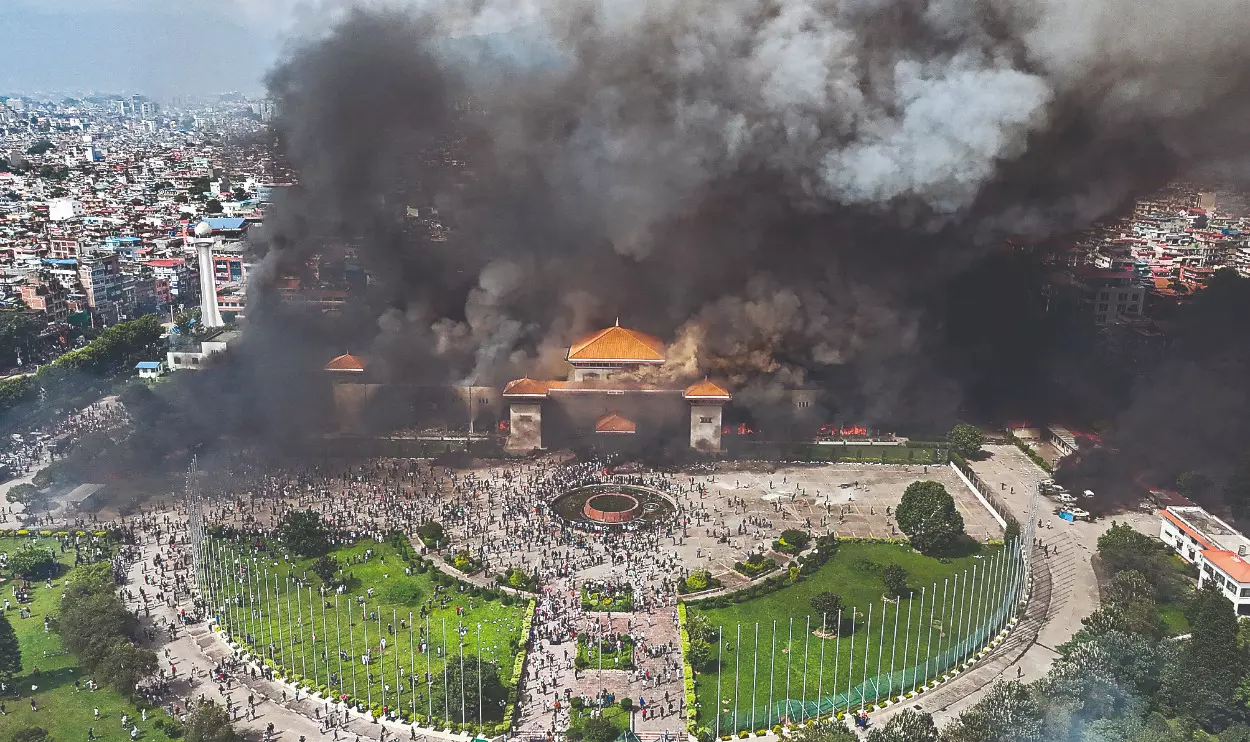Protesters urged to resolve crisis through dialogue

Kathmandu: The Nepali Army and chiefs of other security agencies issued a joint appeal on Tuesday, urging protesters to restrain and resolve the crisis through dialogue.
“As the Prime Minister’s resignation has already been accepted by the president, we call upon all to restrain and not to allow more loss to life and property in this difficult situation,” they said.
They also called upon all concerned parties to find a peaceful solution to the problem through political dialogue.
“A peaceful resolution through dialogue is the only way to restore order and stability,” the joint statement said.
Those who signed the statement included Nepal Army chief Ashok Raj Sigdel, Chief Secretary of Nepal Government Ek Narayan Aryal, Home Secretary Gokarna Dawadi, Chief of Armed Police Force (APF) Raju Aryal, Inspector General of Police Chandra Kuber Khapung and Chief of National Investigation Department Hutraj Thapa.
Nepal reeled under a serious political crisis on Tuesday as Prime Minister KP Sharma Oli resigned in the face of massive anti-government protests with the demonstrators attacking private residences of several high-profile leaders, headquarters of political parties and even vandalising the parliament, a day after 19 people died in police action against the agitators.The students-led protests appeared to reflect the growing public anger with the Oli dispensation over a range of issues including a ban on social media and inaction against alleged corruption as the protesters, defying curfews and heavy deployment of security forces, resorted to arson and stormed various key buildings and establishments.
Hours before Oli’s resignation, the protesters set on fire the Nepalese leader’s private house in Balkot, and attacked properties of President Ramchandra Paudel, former prime minister Pushpa Kamal Dahal, Communication minister Prithvi Subba Gurung, former home minister Ramesh Lekhak and former prime minister Sher Bahadur Deuba.
Oli stepped down shortly after hundreds of agitators entered his office shouting slogans demanding his ouster for the death of at least 19 people in police action during the protests on Monday as well as for his alleged “inaction” against widespread corruption.
K P Sharma Oli: Rebel leader-turned politician fails to provide political stability to Nepal
Veteran politician K P Sharma Oli, who wrecked many governments in the past, kindled hopes for much-needed political stability in Nepal when he assumed power for the third time in 2024, but that proved to be short-lived due to his own actions.
Known for his pro-China stance, Oli was forced to resign in the face of massive protests by youths over corruption and a government ban on social media that resulted in the death of at least 19 people in police firing and injuries to hundreds.
The 73-year-old leader’s ouster has once again pushed Nepal, which has had 14 governments in the last 17 years, into political instability.
He came to power in July 2024 after he ditched his one-time friend Pushpa Kamal Dahal ‘Prachanda’ and joined hands with his foe-turned-friend Sher Bahadur Deuba, who was leading the largest party - Nepali Congress - in the House of Representatives.
Oli, the CPN-UML Chairman, defended his party’s decision to ditch ‘Prachanda’ and form a coalition government with the Nepali Congress, saying it was required for maintaining political stability and development of the country.
Oli, who joined politics as a student activist in his teenage years and spent 14 years in jail for opposing the now-abolished monarchy, became Nepal’s prime minister for the first time in October 2015. During his 11-month stint, Kathmandu’s ties with New Delhi strained.
He publicly criticised India for interfering in Nepal’s internal matters and accused it of toppling his government. He, however, promised to forge a partnership with India to move forward towards the path of economic prosperity ahead of assuming office for the second term.
Oli became PM for the second time in February 2018 when the alliance between the CPN (Unified Marxist–Leninist) and ‘Prachana’-led CPN (Maoist Centre) won a majority in the House of Representatives in the 2017 elections. After their victory, the two parties formally merged in May 2018. During his second term, Oli claimed that efforts were being made to oust him after his government redrew Nepal’s political map by incorporating three strategically key Indian territories, a move that strained ties between the two countries.
India had termed as “untenable” the “artificial enlargement” of the territorial claims by Nepal after its Parliament unanimously approved the new political map.



